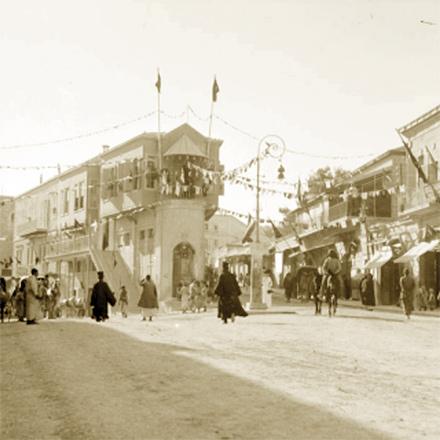- Local News
- Mon-2021-07-05 | 01:35 pm

Nayrouz News Agency :
Although municipalities have been primarily defined in terms of service and public policy, they are potentially important political arenas, said a French historian during a webinar titled "Colonial contingencies: the political marginalisation of the municipality of Jerusalem under the British Mandate”, organised last week by HISDEMAB.
Jerusalem became the capital of the British Mandate in Palestine and enjoyed a special status in terms of policy and politics at the national level, said Falistine Naili, a former director of Ifpo Amman. Naili added that all these should be seen in the context of the general British policy in Palestine.
"Jerusalem had been one of the first cities in the Ottoman Empire to create a municipal council in the 1860s, around the time of the promulgation of the first Ottoman law calling for the establishment of municipal councils in 1867,” Naili emphasised, adding that from the 1880s onward, the city’s municipal council was composed of nine to 12 elected members (through male censitary suffrage only) for a four-year renewable mandate.
Council members had to be Ottoman citizens not the protégées of foreign consulates, Naili noted, adding that Muslims were the predominant majority of the council, but there were also Christian and Jewish members.
"In addition to the elected members, there were four ex officio members: The municipality’s engineer, doctor, veterinarian and head of police,” the historian said, adding that the council’s president (and mayor) was chosen from among the elected members by the imperial government.
Moreover, the municipality of Jerusalem was a major player in modernisation of the city, Naili said, noting that the second half of the 19th century was rife with important changes at the administrative, political and demographic levels.
"The municipality played an important role in the development of the new city centre of Jerusalem which stretched westwards from the Jaffa Gate along the Jaffa Street,” she explained, adding that the municipality also established the municipal hospital and pharmacy, the municipal park and its own offices.
The implementation of the Balfour Declaration characterised the British Mandate in Palestine, however, the executive committee of the Arab Congress of Palestine refused to become the counterpart of the Jewish Agency, since that would imply recognition of the Mandate’s charter and the Balfour Declaration, Naili said, adding that in 1921, the Mandate authorities established the Supreme Muslim Council to have it administer all Muslim religious affairs, including the waqf, the funds for orphans and the religious courts.
"The Mandate authorities reinforced the community bodies while curtailing the power of the municipality, which was asked to provide public services, but no longer played any role in urban planning or even in collecting tax revenues,” she pointed out.
Furthermore, the British mandate authorities intervened repeatedly in municipal affairs, starting with the dismissal of Mayor Musa Kazim Al Husayni for participating in an anti-Zionist demonstration during the Nabi Al Musa festival in 1920, while in 1937, the city’s mayor — Husayn Fakhri Khalidi, elected in 1934 — was exiled for having played an active role in the Arab Revolt that had begun in 1936, Naili noted.
"The British Mandate government relied on a mixture of some elements of the Ottoman legislation and its interventionism until it gradually created its own institutions,” the historian said, noting that the municipality’s loss of power between the end of the Ottoman era and the Mandate period was both a consequence of this process and a colonial tool whose aim was to reduce the margins of political mobilisation of the Arab population.









